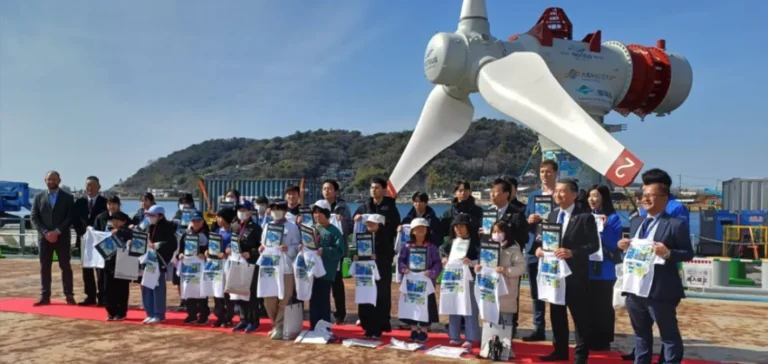Proteus Marine Renewables has recently obtained official Japanese certification for its AR1100 tidal turbine model, capable of generating 1.1 megawatts (MW). This approval, delivered by Japan’s Ministry of Economy, Trade and Industry (METI), confirms the equipment’s compliance with rigorous national standards regarding energy infrastructure and technology. Now connected to the national grid, the turbine officially exports its electrical production into the Japanese network, marking a significant step forward in the development of renewable marine energies. This validation follows an extensive technical and operational testing programme imposed by METI.
Strict testing validated by Japan
Tests conducted by Japanese authorities included varied scenarios aimed at evaluating the turbine’s real-world capacities and operational safety. Among these evaluations were emergency shutdown procedures, compliance with national electric grid standards, and performance under diverse tidal conditions. Upon completion of this process, the AR1100 turbine demonstrated full conformity with regulatory requirements defined by METI for electricity generation equipment. This certification fits within Japan’s growing effort to integrate renewable marine energies into the national energy mix.
Progressive development of tidal technologies
The current success of the AR1100 builds on positive results previously achieved with the AR500, a 500kW turbine successfully deployed in 2021 in Japanese waters. This pilot device had then reached an availability rate of 97%, thereby validating Proteus’s initial technological choices. Based on a modular design, the company incorporated major technical innovations such as advanced pitch and yaw control systems, enabling the AR1100 to reach a higher rated power of 1.1MW. This turbine represents an intermediate step before the deployment of the AR3000, an even more powerful turbine scheduled for 2028.
Strategic partnership for renewable energy in Japan
This project is part of a strategic collaboration between Proteus Marine Renewables and the Japanese company Kyuden Mirai Energy Co., Inc. (KME), the local project representative. The partnership aims to reinforce Japan’s renewable energy generation capacity by demonstrating the technological and operational viability of tidal energy within the national electricity supply. Following the successful deployment and official certification of the AR1100, both companies are now exploring further opportunities to increase tidal power generation in Japan. Upcoming stages of the programme notably include preparations for the future AR3000 model, intended to further consolidate this energy source within the country’s energy infrastructure.






















